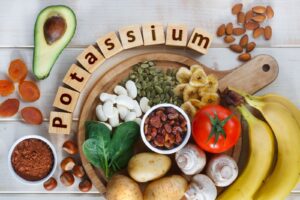The Importance of Vegetables and Potassium for a Healthy Lifestyle

Maintaining a balanced, nutritious diet is key not only for weight management but for overall health and longevity. Eating vegetables and getting enough potassium are essential components of a balanced diet that supports long-lasting health and wellness.
Why Are Vegetables Essential in Our Diet?
Including a variety of vegetables in your daily meals can greatly reduce the risk of chronic diseases such as heart disease, diabetes, and certain cancers. Here’s why:
Nutrient Powerhouses
Most vegetables are naturally low in fat and calories and contain no cholesterol. However, they are packed with vital nutrients including potassium, dietary fiber, folate, vitamin A, and vitamin C. These nutrients provide a range of health benefits:
• Potassium: Essential for maintaining healthy blood pressure, potassium helps balance sodium levels and promotes cardiovascular health.
• Dietary Fiber: Fiber aids in digestion, helps reduce cholesterol levels, and may lower the risk of heart disease. Fiber-rich foods like vegetables can also help with weight management by promoting a feeling of fullness with fewer calories.
• Folate: Important for cell division. Folate (or folic acid) is especially crucial for women of childbearing age.
• Vitamin A & C: These vitamins are important for immune health, skin health, and eye function.
The Benefits of Potassium: Why You Need This Essential Mineral
Potassium is a vital mineral that plays numerous roles in the body, including blood pressure regulation, muscle function, and nerve communication. Here are some potassium facts and benefits:
• Lowers Blood Pressure: Nearly one in three Americans suffers from high blood pressure. Potassium helps regulate blood pressure by aiding the body in removing excess sodium.
• Reduces Water Retention: Potassium can help reduce bloating and water retention.
• Supports Muscle and Nerve Function: Potassium is crucial for muscle contractions and communication between muscles and nerves, ensuring proper muscular function.
• May Prevent Kidney Stones and Osteoporosis: Studies suggest a diet rich in potassium can help protect against osteoporosis and reduce the risk of kidney stones.
How Much Potassium Do You Need?
Most health guidelines recommend an intake of 3,500–4,700 mg of potassium per day for optimal health. Below are some potassium-rich foods, along with the approximate potassium content per 100 grams (3.5-ounce serving):
• Beet Greens, cooked: 909 mg
• Yams, baked: 670 mg
• Pinto Beans, cooked: 646 mg
• White Potatoes, baked: 544 mg
• Portobello Mushrooms, grilled: 521 mg
• Avocado: 485 mg
• Sweet Potato, baked: 475 mg
• Spinach, cooked: 466 mg
• Kale: 447 mg
• Salmon, cooked: 414
• Bananas: 358 mg
• Peas, cooked: 271 mg
The Bottom Line
Incorporating more vegetables and potassium-rich foods into your diet can significantly impact your overall health and well-being. With benefits like reduced blood pressure, better digestion, and improved muscle function, it’s easy to see why a nutrient-rich, balanced diet is vital for everyone. Aim to add a variety of vegetables and potassium sources to each meal, and your body will thank you!


